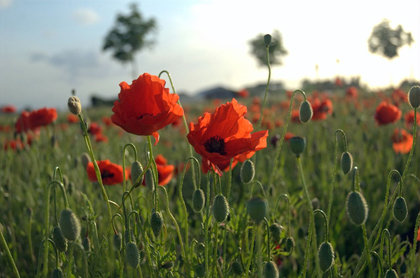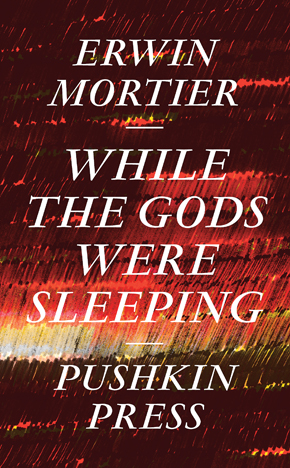Swarms and sorrows
by Erwin MortierHe frequently took me on trips with him when the war was over and he meticulously documented what I call the congealing, the great levelling, in all respects after the ravages and the euphoria of peace. The smoothing-over of the tormented earth. The cemeteries where the fallen were gradually put in straighter and straighter ranks, disciplined even in death. The wooden crosses which were replaced by polished stone tombs in charming cemeteries beneath the subdued melancholy of weeping-willow leaves or pine needles – it struck me as a wry euphemism, not to say a sad paradox, that in order to keep the memory of the destruction and oceans of blood alive, they mowed the lawns immaculately, constructed solemn temples, carved mourning statues, lit eternal flames. Over the bones and the corpses and the countless shattered lives an arcadia stretched out that was itself constantly struggling against becoming overgrown, a process that would have spread like wildfire if they had not, out of piety, or out of shame, left the ravaged earth in peace and declared the whole area a cemetery.
But I also remember the rage that seized me when, in the early summer of 1919, we were in Alsace, a part of the front zone where we had not been before. En route I had been dozing in the car, lulled to sleep by the mild temperatures and the pristine green of nature renewing itself. When I woke because the car slowed down, at the bottom of the valley that unfolded before us, at some distance from the road between woody clumps and fields, a broad scar of earth churned into hills and gullies stretched as far as the eye could see.
It was that easy-going atmosphere that filled me with fury. The swarms of summer hats and parasols. The improvised signposts on the verge. The cars and carriages parked in the fields near the edge of the wood which suggested an open-air fair.”
It was not the sight of it that I found chilling, but the swarming of scores, hundreds, of human figures, white and dark dolls that clambered chaotically over the heaps of earth like foraging ants. Young men supported their wives or fiancées as they helped them jump from ridges. Sucking contentedly on their pipes, fathers pointed out old foxholes and barbed wire, tanks stranded in the earth and abandoned artillery, or they stood on top of all those masses of ground with their hands on their hips, looking out over their surroundings.
It was that easy-going atmosphere that filled me with fury. The swarms of summer hats and parasols. The improvised signposts on the verge. The cars and carriages parked in the fields near the edge of the wood which suggested an open-air fair, complete with pedlars not offering refreshments but grenade fragments or polished bullets engraved with place names and landscapes or decorative motifs—the pleasure I mean, which was not even hidden behind horror or bewilderment. The pleasure of bewilderment in itself, the eagerness of horror that I saw there. But my husband said: “I think it’s inevitable, Helen.”
He got his camera from the case on the back of the car, opened the tripod and planted it in the soft, mild-smelling forest earth on the edge of the valley. “Are we that much better?” He prepared the camera to capture the scene.
***
Time gives greater complexity to the texture of the facial expressions on those prints. Their readability has become less unambiguous – like my own. Look at those two women standing there arm in arm on one of the countless paths that the stream of disaster tourists has worn between the mounds of earth and the old bomb craters. They seem to be sisters. Perhaps twins, given their almost identical clothing and coquettish hats, and the fact that they are walking arm in arm.
But why is one of them carrying a bunch of flowers in one hand? Not a hastily picked bunch of wild flowers but a carefully arranged bouquet, as the ribbon that binds the stalks leads one to suspect—where did they lay it? In the nearby cemetery perhaps, or on the approximate spot from where a man, a fiancé, a brother or father, whose body had not been found and perhaps never would be, had sent his last letter?
And even now when I see those solid heads of families again who, holding their children by the hand, stroll between the broom and the briars as if they were at the zoo, I find it harder to get worked up than before. I know by now what weird forms desperation can take in a human being, how the pleasure of bewilderment carefully shields us from a fear or despair that might totally destroy us – what a strange emotion fear remains. The most alchemical of emotions, now turning to lead, now to gold. Isn’t each pleasure a hasty prayer, Rachida my girl, an invocation?
***
I’m reminded of my uncle, who every few days dropped by the mairie to open the official dispatches. He considered it his duty to inform the families affected of the death of a son or a brother, a father or husband.
So once every so many mornings he went “down”. In the adjacent café he first had a coffee and spirits while he went through the papers, before entering the mairie in order, as he only ever said out loud at home with us, to “bring in the sad harvest”. He had several times sat on the town council and was doing it from a kind of noblesse oblige, a task that he took over from the official town crier who would normally convey the message, but who turned out to be drunk more and more often because he couldn’t stand it any longer.
My uncle had the envelopes cut open, at each name gave a melancholy sigh, which became more routine each month, and set forth. Eventually everyone knew what it meant when he was seen leaving the mairie and crossing the market square. People held their breath. What side road would he take? People soon realized that he arranged the names in his head according to the houses he would have to visit, that he turned his walk into a circular route which began in the market square and ended at our house. There he would lower himself onto the bench under the tree and did not want to be disturbed until lunchtime.
As soon as he took a particular route one side of the village breathed easier with relief – you could hear the relief creeping through the house fronts that he turned his back on. The joints in the walls seemed to expand as if the stones had braced themselves, and you could see the houses by whose door or front garden he stopped almost cringe. Because everyone knew the purpose of his knocking he did not need to say much. When the door opened and from the darkness beyond a fearful questioning look met his, it was mostly sufficient to nod – unless several men in the same family had been called up.
***
It is the women who take the blows, he was wont to say. Imagine the look on the face of a mother with two or three sons at the front, not exactly a rarity in large farming families in the countryside. The uncertainty behind the certainty that you are knocking at her door to report the death of one of her children. She has seen you coming across the yard. Above the hedge of the front garden with the country flowers, which have been so immaculately hoed and raked, since weeding helps take her mind off the fate of her boys, she has recognized your hat. She has heard the gate creak. She would like her house to be an unassailable fortress, a thick shell. She sees you coming across the yard or up the garden path. She realizes that this time there is no blood on the lintel and side posts of her door, that the angel with the sword has not spared her house this time – all she does not yet know is which of her sons has fallen.
“Who?” is the word burning not so much on her lips as in her eyes, tell me who: our Jean or Arnaud or Rémi? The names shuttle as it were across her retina: which of the beings to whom she has given birth, whom she has felt pull out of her to the spasms of her abdominal muscles, the life that she saw grow up and nurtured, cared for, gave food and drink, beat and kissed, that caused her laughter wrinkles or grey hairs, filled her with pride with its school results or muscular strength, made her double up with anxiety when it had measles, or about its drinking or gambling habits – the top of the class or the sponger or the petty thief who joined up to avoid the cell and shame. Who is it, monsieur? The oldest or the youngest? Or the middle one, the apple of my eye? There were doors where he knocked a first time, and a second time. On the third or fourth occasion there wasn’t much more to be said.
What do you do when you have to tell a mother the last of her sons has died, or after her sons her husband too, and she doesn’t open up and you go round the back? You see her in her back kitchen with a basin on her lap, peeling potatoes so furiously that she reduces them to curls. She doesn’t even look up when you come in. What do you do then? You sit down at her table and say nothing and wait.
“It’s the women who take the blows.” He repeated it more and more often when he returned from his morbid rounds and shut himself up in his garden. “Always the same old story, we let ourselves be seduced by the high-falutin’ words of the high-ups, the sweet mouth of power, but we always forget the arsehole. Don’t stare at me so angrily, dear sister. Your daughter is old enough to listen to other things than sweetly lilting quatrains. She’s not a child any more. Look at the arsehole, ma fille. Who gets to wave the palm branch and who catches the shit? That is the question on which the whole of history turns.”
Extracted from While the Gods Were Sleeping, translated by Paul Vincent.
Erwin Mortier was born in Ghent in 1965. His debut novel Marcel (1999) was awarded several prizes in Belgium and the Netherlands and critically acclaimed throughout Europe, and was followed by My Fellow Skin and Shutterspeed (both 2000). He has also published volumes of poetry and essays, and is a regular contributor to newspapers and literary magazines across Europe. While the Gods Were Sleeping is shortlisted for the 2015 Independent Foreign Fiction Prize and published by Pushkin Press, along with his earlier novels.While the Gods Were Sleeping and his earlier novels are published by Pushkin Press. Read more.
erwinmortier.be
++ NEWS UPDATE 13 April 2015: While the Gods Were Sleeping is shortlisted for the 2015 Independent Foreign Fiction Prize. Read more.
Paul Vincent taught Dutch at the University of London for over twenty years before becoming a full-time translator. His previous translations include Louis Couperus’s Ecstasy, Inevitable, Psyche and The Hidden Force as well as J.J. Slauerhoff’s The Forbidden Kingdom. In 2012 he was awarded the Vondel Translation Prize for his translation of Louis Paul Boon’s My Little War.
Erwin talks to Bookanista about While the Gods Were Sleeping and other works.



